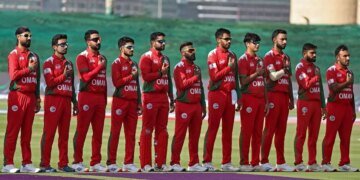Saudi Arabia’s trajectory in football mirrors its broader ambitions on the world stage. From their debut at the 1994 World Cup to hosting the 2034 tournament, the nation’s evolution in the sport reflects a mix of cultural passion, political strategy, and monumental investment.
A Rich Football Heritage
Saudi Arabia’s football story began in 1956 with the founding of the Saudi Arabian Football Federation (SAFF). Early achievements, such as winning the 1984 AFC Asian Cup, showcased the nation’s potential. However, the global stage beckoned in 1994 when the Green Falcons stunned the football world at the USA World Cup. Saeed al-Owairan’s iconic solo goal against Belgium remains a high point in the kingdom’s sporting history.
The years following saw challenges, including lackluster performances and crushing defeats, such as the 8-0 loss to Germany in 2002. Yet, Saudi Arabia continued to qualify for major tournaments, cementing its position as a consistent player in Asian football.
The Vision 2030 Era
The transformative turning point came in 2016 with the unveiling of Saudi Arabia’s Vision 2030, a roadmap to diversify its economy and enhance its global influence. Sports, particularly football, were earmarked as vehicles for soft power and international prominence.
The 2018 World Cup in Russia signaled the need for reform. Saudi Arabia’s opening 5-0 loss to the hosts prompted immediate action. Under the leadership of Crown Prince Mohammed bin Salman, football infrastructure and governance underwent sweeping changes.
Strategic Investments in Global Football
From hosting international events like the Supercoppa Italiana and the Supercopa de España to acquiring Newcastle United through the Public Investment Fund (PIF), Saudi Arabia has cemented its presence in global football. The 2022 signing of Cristiano Ronaldo by Al-Nassr marked the beginning of a new era, attracting international stars to the Saudi Pro League and elevating its profile.
Saudi Arabia’s proactive engagement extended to fostering relationships with football bodies worldwide, securing hosting rights for the 2027 AFC Nations Cup, and positioning itself as a hub for major tournaments.
The Road to 2034
The kingdom’s bid for the 2034 World Cup encapsulates its ambitions. After years of strategic planning and high-profile deals, Saudi Arabia emerged as the sole bidder for the tournament, solidifying its status as the inevitable host.
April 2024 brought a landmark partnership between FIFA and Aramco, further intertwining Saudi Arabia’s resources with football’s governing body. By October, Saudi Arabia had signed key agreements, including one with Ukraine’s Football Federation, showcasing its commitment to fostering global collaborations.
A New Era of Football Politics
Saudi Arabia’s football journey reflects its broader geopolitical strategy: leveraging sports for global influence. Hosting the 2034 World Cup marks the culmination of decades of effort, placing the nation at the epicenter of football politics.
While critics highlight concerns over human rights and sportswashing, there’s no denying that Saudi Arabia has reshaped the footballing landscape, combining passion, investment, and political savvy to achieve its goals.
As the football world looks ahead to 2034, all eyes will be on the kingdom, poised to deliver a tournament that promises to be as ambitious and transformative as its vision for the sport.
































